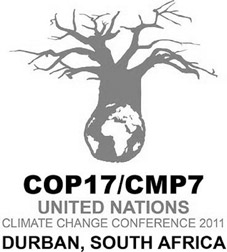Cancun to Durban to Weligama: COP 17 handouts
 It's not 'doomsday sooth-saying' anymore. Thousands of scientists
upon research and observation have confirmed that climate change and
global warming to be a real threat to all life on earth. It is no longer
a phenomenon the world's powerful 'leaders' can pick up every year when
a global climate conference is held, and then move on to place it in
their backburners. It's not 'doomsday sooth-saying' anymore. Thousands of scientists
upon research and observation have confirmed that climate change and
global warming to be a real threat to all life on earth. It is no longer
a phenomenon the world's powerful 'leaders' can pick up every year when
a global climate conference is held, and then move on to place it in
their backburners.
The truth is that their otherwise busy agenda; in managing
self-inflicted debt burdens, related financial crisis and overt and
covert battles for dominance of vital resource ownership does not permit
them to think and act in the long-term well being of 'our only home' as
Archbishop Desmond Tutu recently chose to call Mother Earth. We as human
beings are not doing enough to mitigate this 'huge, huge enemy called
global warming and climate change' he said, calling for sacrifices to be
made by the rich and poor to take bold and brave steps to seek lasting
solutions.
Here and now
Closer home, last week we got another taste of it, when intense
depressions caused heavy rains and gale force winds. They blew across
our Southern coast killing 19 people and injuring many more. Reportedly,
43 people have gone missing while 22,616 from 5,220 families were
displaced in Galle and Matara districts alone, as a result of this
sudden gale and gush of rain. Among the missing were 30 fishermen from
Kapparathota in Weligama, of whom only ten bodies were found by Sunday
last. Over 600 houses were destroyed, while 4,500 were partially
damaged. The Meteorological Department has been asked to submit a report
this week on the Department's alleged failure to forecast such
catastrophic weather. They are often blamed for being lackadaisical in
weather forecasting despite modernization of the facilities. Apart from
possible human error, I have often heard responsible met officers refer
to their helplessness in making proper assessments for these happen at
random and are mal-effects of climate change.

Giving it further thought, we should query if the Thai meteorology
authorities could have predicted the intensity of the catastrophe that
befell the city of Bangkok in the recent floods as a result of heavy
rain in catchments. It is the same with the bush-fires in Australia's
Queensland or this week's devastating floods in New South Wales. The
question we should be asking ourselves is, if what we see happening
around us and more so the frequency of its occurrence is, usual
phenomenon. The small island nations all around the globe including our
neighbor Maldives are the hardest hit and one wonders if they can be
saved with the Green Climate fund, when the ocean around them will keep
on rising as a result of the continued warming of the poles and the
melting of the ice-burgs.
Beyond funds and technology
If we were to fool ourselves that the proposed hand-out of funds (US
$ 100 billion a year Green Climate Fund) and innovative technology
(Cooperation on Clean Technology) alone can mitigate the already
out-of-hand climate change parameters for the better, we perhaps are
only kidding ourselves. They indeed are necessary but will they be
sufficient? Much like the 'bourse' type invention of 'you pay me for the
merit I have acquired (saving of CO2) and buy from me a warrant to sin
with it (Right to emit equivalent doses of CO2)' instrument of the
'Carbon Offset Fund' mechanism, these will also serve to woo those who
choose to look at the availability of funds as serving their short-term
political survival needs. Yet, the real solution to the issue of climate
change mitigation of changing our lifestyles, adopting more environment
friendly ways of life all round, will remain being a far cry in the
wilderness.
Small steps
In my mind, that is just what the COP (Conference of Parties) of the
United Nations Framework Convention on Climate Change (UNFCC) may
achieve when for the 17th time 'climate negotiators' have gathered in
Durban, South Africa during this and the next two weeks. As a safeguard,
the organizers have chosen to call it 'A Summit of small steps', in
contrast to the huge hue and cry made of the Copenhagen Conference of
2009 calling it 'Hopenhagen'. What we in effect saw in its aftermath was
failure where achievement fell far short of pre-event expectations.
We saw a somewhat theatrical performance from the US president who at
the penultimate hours of the Copenhagen summit brokered a new alliance
banding US, China, India, Brazil and South Africa. They chose to
hurriedly draft a separate 'Copenhagen Accord' which was 'noted' by the
rest of the countries attending but not adopted in agreement. None of
the big economies were willing to 'mitigate' their wasteful ways while
those who are yet to get there were resisting being asked to do so by
the larger emitters.
Threshold levels
This month, two separate UN reports stated that greenhouse gases had
reached record levels in the atmosphere. According to them an unduly
warming globe is expected to lead to heavier rainfall, more floods,
stronger cyclones and more intense droughts, some of which we have
already begun to experience. The UN's International Energy Agency has
predicted that even the measures that have been agreed on and are yet to
be actioned may be inadequate to prevent the planet from heating up
beyond the 2 degrees Celsius level.
|

Destruction caused by heavy rains and gale force winds.
Picture by W P Dharmasena, Matara group corr |
Climate change mitigation action that began with the Kyoto protocol
adopted as far back as 1977 and came into action in 2005 is still to
make any substantial impact on moving their nations towards such action
sans a few exceptions like Japan, New Zealand and the Nordic countries.
What the protocol in essence called for was for all countries to take on
proportionate and effective mitigation action to reduce CO2 and other
green house gas emissions they made to the earth's atmosphere.
Lifestyle changes
The two largest emitters the United States and China have for years
now resisted signing the protocol agreements causing a huge dent in the
ability of Kyoto agreement to be successful. According to sources, the
European Union, New Zealand, Australia, Norway and Switzerland are
likely to sign up at best in agreement of meeting their commitments.
China will be unwilling to make any commitment until Washington does the
same. Russia, Japan and Canada who are current signatories all say they
will not sign up to a second commitment period, unless the largest
emitters also meet their fare share of commitment.
Real mitigation action on climate change to halt global warming will
call for intense austerity measures within developed economies. Big
emitters US, China and Europe will need to take measures that will
ensure that their citizens adopt more modest lifestyles. Developing
nations will be vary of carbon caps, for that could hurt their growth
and with it the ability to lift millions out of poverty.
But then, do we and those that are now in Durban determining our
future, have any choice but resolve to take on such action?
[email protected]
|



